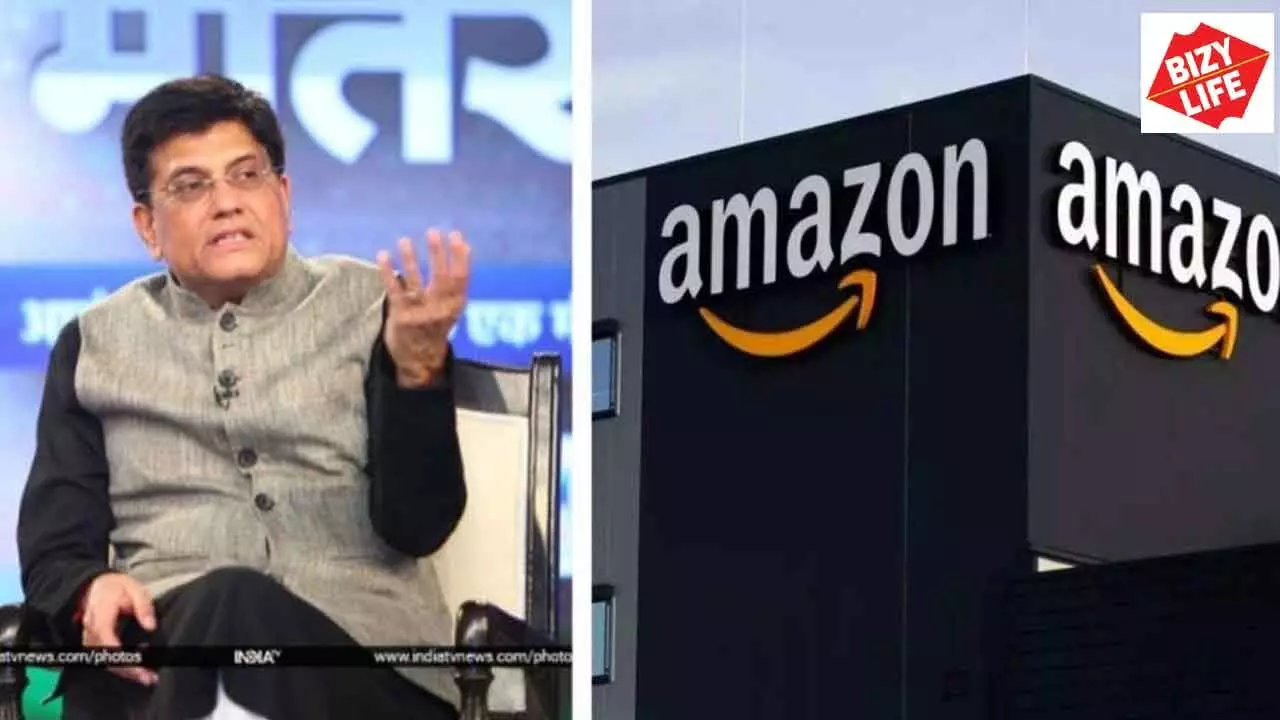Wonder why the Modi govt is not banning Amazon if it’s doing illegal business in India
Recently, Union Commerce and Industry Minister Piyush Goyal has admitted that Amazon has no permission to do online retail business in India
Wonder why the Modi govt is not banning Amazon if it’s doing illegal business in India

The billion dollar question now is why the Modi government is allowing Amazon and other ecommerce players to circumvent the prevailing law and sell products through third parties? Isn’t that illegal? Has the Modi government been so weak since 2014 that it can’t take action against Amazon and other e-tailing majors that are brazenly flouting norms?
Piyush Vedprakash Goyal is a shrewd politician. The Bharatiya Janata Party (BJP) Rajya Sabha member for nearly 15 years and a qualified chartered accountant was elected to the Lok Sabha Parliament from the Mumbai North parliamentary constituency in the recent general elections in his electoral debut. He has been a key member of the Narendra Modi government at the Centre since 2014. In the process, he held various portfolios, including renewable energy, coal, mines, finance, railways and textiles. He was the Union Minister of Consumer Affairs, Food and Public Distribution, till recently. But he is better known as the Union Minister of Commerce and Industry, whose reins he took over in May 2019. That way, he is one of the most experienced union ministers in the Modi regime.
You may ask why this long introduction about Mr Goyal the politician. There is a reason for that. It’s a valid one too. He has recently made a startling revelation which clearly undermines the authority of the Modi government. According to him, global ecommerce giant Amazon has no licence to do online retail business in India.
While speaking after releasing ‘Assessing the Net Impact of E-Commerce on Employment and Consumer Welfare’ report brought out by Pahle India Foundation last week, the Union Minister said: “They (companies like Amazon) are after all ecommerce platforms. Ecommerce platforms can’t do business with the consumer. They only re-route all the business through an entity to show that it’s business to business. But the reality is all of you buy on these platforms. Don’t you?”
That means Amazon can’t do B2C (business-to-consumer) transactions in India. To put it in simple terms, it can’t sell products directly to consumers in India. But then Amazon is precisely doing that through its ecommerce portal by using what it calls resellers. These resellers are Indians and companies owned by Indians. They use the Amazon platform to sell their products.
Technically, Amazon is not selling products directly to consumers. But in reality, that’s what it is doing. Interestingly, most consumers who buy on Amazon portal are also under the impression that they are buying the products directly from Amazon.
Further, it is an undeniable fact that online retailing is taking a big toll on the small retail shops and kirana stores across the country.
According to the Confederation of All India Traders (CAIT), India is home to over 5.77 crore small business enterprises that cumulatively employ countless millions. It cited data compiled by the National Sample Survey Office (NSSO) in 2013, which implies that this number must be much higher by now.
Goyal himself said the future of over 100 million (10 crore) small stores would be at stake because of ecommerce players. The major cities accounted for 10 million of those stores.
CAIT has also been relentlessly fighting against the onslaught of online retailers. It also sought a level-playing field for small traders before allowing ecommerce legally. That has not happened till now.
Though there is no legal sanctity to e-tailing now, ecommerce is growing by leaps and bounds in India. According to a recent report by Invest India, the investment promotion and facilitation agency set up by the Centre, the country’s e-commerce space will grow to $325 billion by 2030. This segment currently accounts for $70 billion in sales and seven per cent of India’s total retail market. It is said that most of the growth in ecommerce will be from rural regions. This means that small stores in rural areas will also reel under the impact.
Predatory pricing is another issue as companies like Amazon are pumping billions of dollars into India to sell some products at lower prices in order to capture the market. They are doing this despite the fact that there is no legal sanctity to their business in the country!
The billion dollar question is about why the Modi government is allowing Amazon and other ecommerce players to circumvent the prevailing law and sell products through third parties. Isn’t that illegal? Has the Modi government been so weak since 2014 that it can’t take action against Amazon and other e-tailing majors that are brazenly flouting norms?
Frankly speaking, I am not against online sales. From the customer point of view, one can save lots of time while shopping online. It is the most convenient and hassle-free way of shopping. These days, it’s fast and quick too. That’s the reason why it is gaining popularity and even people from remote parts of the country are ordering online nowadays. It’s an environmental-friendly way of buying things; moreover there is no need to travel for shopping, either using one’s vehicle or by public transport. But allowing global giants like Amazon to do illegal business in India is beyond comprehension. It doesn’t augur well for Brand India on the global stage if the country’s Industry Minister shows his helplessness in tackling the illegal businesses of ecommerce majors.
It’s time the Indian government brings out a comprehensive policy that protects small businesses from predatory ecommerce giants.
But before that, it should initiate stringent action against the illegal maneuvers of Amazon and its ilk. Hope the Modi government is listening.

